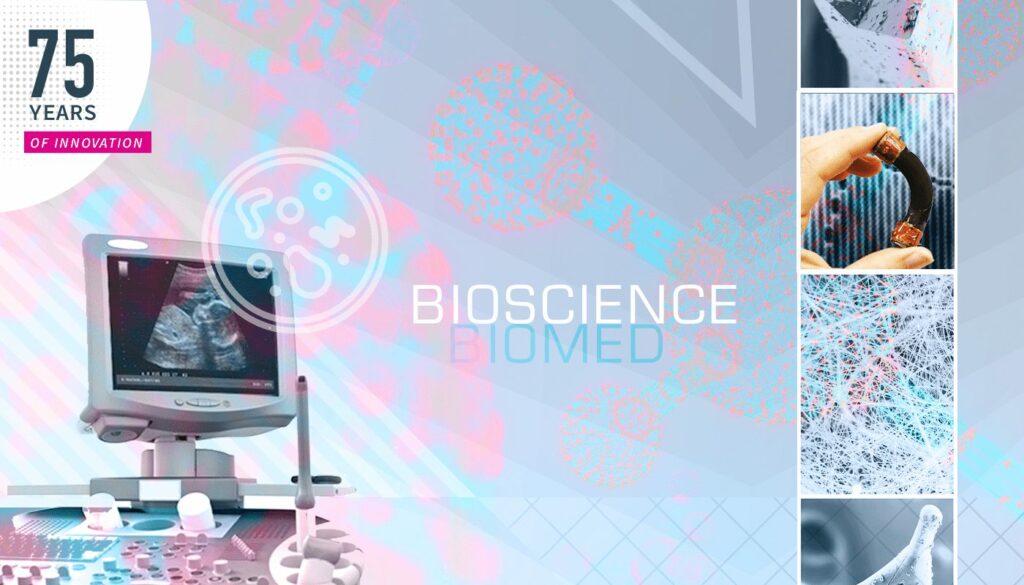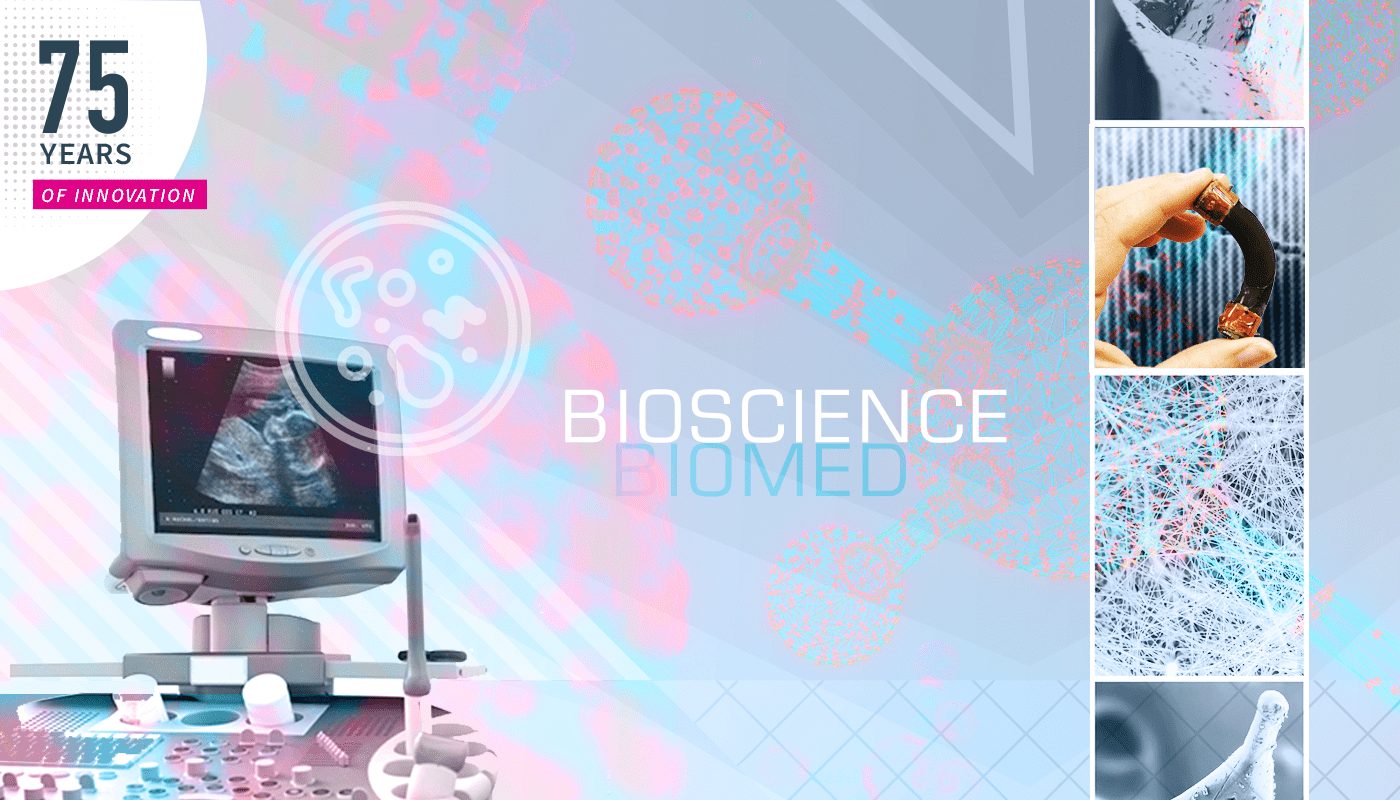The 75 Years of Innovation series highlights the groundbreaking innovations spanning from SRI’s founding in 1946 to today. Each week, SRI will release an innovation, leading up to its 75th anniversary in November 2021.

A technological quest to make the world healthier
SRI has transitioned from a model where people are looking for individual drugs for individual diseases to building platforms to go after multiple indications and to give us and our collaborators an unfair competitive advantage in terms of how we develop those drugs”
— Ian Colrain, President of SRI’s Biosciences Division
The discipline of bioscience has given the world amazing breakthroughs in healthcare, leading to longer, healthier lives. SRI International is proud to have been part of this healthcare revolution, from advances in drug technology to robotic surgery.
SRI and its Biosciences division have a long and lasting impact on the medical world, here is a round-up of some of those novel advances in healthcare and medicine.
Feverish medical insights
From the power of a microscope to how humans sleep, SRI has delved deeply into human health over the last 75 years:
Microscopy
SRI has added immense value to the world of bioscience through instrumentation. The commercialization of the world’s first high-resolution Transmission Electron Microscope (TEM) in 1940 at RCA Laboratories, (eventually renamed Sarnoff Corporation and now part of SRI International), is one such example. Developers eventually improved magnification by 10,000 times. TEM is a technology applied across a multitude of areas including material science, medicine, biological research, forensic analysis, geology, and so on. This high-resolution microscope offers magnifications of between 50 to 50 million times.
Cancer drugs
Cancer is a disease that impacts all of us at some point, either directly or someone we love. The fight against cancer at SRI began in 1960 with a drug named Vidarabine, based on the isolation of two nucleosides from a marine sponge found in the Caribbean. Since then, SRI has brought to the world several important cancer drugs including Targretin® in 1999, used to treat cutaneous T-cell lymphoma. It has also been part of the development of nearly 50 cancer drugs that have made it into human trials.
Ultrasound
SRI did not invent ultrasound, the concept of which dates to 1794; However, SRI made ultrasound what it is today, using a technique called “Reflex Transmission Imaging” (RTI) developed in the 1980s. RTI added the level of fine-grained imaging needed to make ultrasound a practical medical diagnostic tool used the world over.
Twin studies
Exploring the health of twins can give important insight into the role that genes play in healthcare. In 1995, SRI created a comprehensive study sample of twins that was turned into a community-based registry, the Twin Research Registry (TRR). This registry is an important database used by scientists to understand the role of genes in a variety of diseases. In 2019, SRI transferred the TRR into the hands of Stanford Medicine; at that point, there were 6,208 individual twins in the registry.
FOX Three Molecular Guidance System
Drugs needed to treat specific diseases can be toxic to the rest of the body. To overcome this barrier in the treatment of cancer and other diseases, SRI developed the FOX Three Molecular Guidance System. The FOX Three technology works by using modeling to match the receptor on a target cell to a peptide and then synthesizes the peptide to exact requirements. The peptide becomes a unique delivery agent called an “MGS”, the peptide delivers the cargo (drug) wrapped in a lipid nanoparticle across the membrane and into the target cells. The targeted delivery helps to avoid uptake in other cells and so helps to reduce the potential of drug sensitivity. Developed in 2017, FOX Three has since been used to develop new immunotherapies to further help cancer patients.
Building upon the past to give hope for healthy futures
Many of the bioscience developments from SRI have been built upon past discoveries and inventions at the company, allowing SRI to continue to innovate.
Sleep studies
A decent night’s sleep is essential for health and happiness, but sleep can be a very difficult area of human behavior to study. For the past 20 years, SRI has had a Human Sleep Research Program populated by scientists dedicated to understanding this important aspect of our daily lives. The sleep research carried out at SRI includes ground-breaking studies about developmental changes in sleep and the brain across adolescence; the role of hot flashes and hormones in sleep disturbances in midlife women; sleep disturbances in alcohol use disorder and the pathophysiology of insomnia. The SRI lab is a world leader in the validation and development of wearable devices for sleep assessment and novel treatments for sleep disorders.
The diagnosis of neurodegenerative diseases such as Alzheimer’s
Another barrier that SRI overcame with innovative technology is the blood-brain barrier. The DiaCyt™ CNS (Central Nervous System) drug-delivery platform was announced in 2021 as a system that helps deliver drugs to the CNS that would otherwise prevent biologic therapies such as antibodies and gene therapies being used. This system will allow cutting-edge therapies to be used in the treatment of Alzheimer’s and Parkinson’s and well as brain cancer and other neurological diseases.
SRI’s help during the Covid-19 pandemic
SRI’s vast knowledge of health and medicine has been put to the test with the Covid-19 pandemic. Working with institutes, universities, and government bodies, SRI has pooled resources to find pathways for all through the pandemic. Existing SRI platforms, used for other diseases, have been applied to the Covid-19 response. These platforms have helped to repurpose existing antiviral drugs or design new antivirals in response to Covid-19.
SRI has also developed platforms that can perform rapid testing for SARS‐CoV‐2 (coronavirus) infection that helps in fast, mass testing situations. SRI is currently working on the development of a handheld device for immediate detection of the coronavirus.
Further developments include drugs that help the immune system target and counter the coronavirus. The application of computer intelligence platforms to solve complex medical conditions such as those caused by a novel virus is embraced at SRI. By using intelligent computer modeling programs to understand the protein structure of viruses such as SARS‐CoV‐2, this structural knowledge allows scientists to develop targeted therapies that focus on the folded structure of these proteins.
Future health
SRI is dedicated to building new platforms and programs to accelerate and advance modern healthcare for all. Whether this is novel, first in class, or tackling the undruggable, SRI excels at tackling the seemingly unsolvable.
SRI’s focus is on targeted precision therapeutics and AI-driven molecular design, and more. Some of these new health innovations include:
Molecular guidance systems
A way to create molecular guidance systems that can be programmed to selectively and safely reach the cellular AND intra-cellular targets of interest, especially currently undruggable targets. Systems that can be programmed to controllably deliver payload through the blood-brain barrier.
Next-gen AI drug development
Next-generation AI techniques for drug development incorporate Explainable-AI, combining it with a state-of-the-art continuous flow manufacturing system for rapid iterative development.
Precision medicine
SynFini™: SRI International developed the SynFini™ platform to automate multi-step synthesis using a method of Reaction Screening and Optimization (RSO). The SynFini™ platform is a tool used to augment the role of a chemist in developing optimized molecular synthesis methods. The platform uses machine learning (ML) to predict new reactions to enhance the use of known reaction mechanisms in existing databases. Within a medicine context, Synfini™ is used to develop more targeted biologic compounds and therapeutics
Techneins™: SRI Biosciences lab developed the Techneins™ molecular discovery platform used to create potent and selective affinity reagents that can be used as either therapeutics or diagnostic reagents.
SRI has been behind some of the world’s most important medical breakthroughs and will continue their work in biosciences to make the world a healthier place.
Resources
Ultrasound: https://medium.com/dish/75-years-of-innovation-ultrasound-1999c724f750
Cancer Drugs: https://medium.com/dish/75-years-of-innovation-cancer-research-7929abbf119e
FOX Three Molecular Guidance System: https://medium.com/dish/75-years-of-innovation-fox-three-molecular-guidance-system-3c7e01a1f8ef
SRI introduces DiaCyt™ CNS drug-delivery platform: https://www.sri.com/emerging-tech/sri-introduces-diacyt-cns-drug-delivery-platform-at-2021-jp-morgan-conference/
The Dish, Solving for sleep: https://medium.com/dish/solving-for-sleep-8d2513893dad
SYNFINI™: https://www.youtube.com/watch?v=HdY6nxKx5O8
TECHNEINS™: https://www.sri.com/case-studies/techneins/
Ian Colrain, Former President of SRI’s Biosciences Division: https://www.youtube.com/watch?v=J4H4Fw3PnqY



